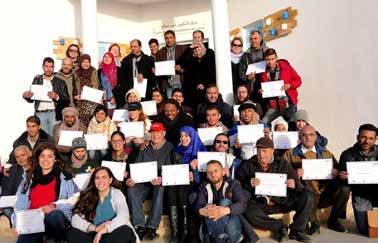
Description of the project: Acacias For All is a social enterprise involved in the restoration of degraded ecosystems through reforestation and sustainable agriculture. The objective is to plant 2 green barriers of acacias through the country, protected by an agreement signed by the Ministry of Agriculture. The project implements alternatives to intensive agricultural techniques (e.g. organic agriculture, permaculture, agroforestry) and stimulates the start-up of cooperatives which generates employment and revenues. A think-tank has been created, Tunisia Climate Lab, to rethink environmental and social challenges in the country in view of climate change, and create a space for dialogue between stakeholders of diverse interests.
Climate impact: Desertification and water scarcity are the main consequences of climate change in Tunisia. Acacias act as a wall against sand, stop desertification and establish a protective perimeter favourable to agriculture and biodiversity. They also protect surrounding trees, especially olive trees. Training offered to farmers by the think-tank raise the population’s awareness of a resilient path to development.
Gender impact: Acacias for All now works with 26 female farmers from 2 cooperatives and with farmers from several regions in Tunisia. These women, who are leaders in their communities, are trained on eco-friendly agricultural techniques and knowledge transfer. They organize cooperatives to transform and value their products according to principles of equitable business. The revenue generated through the sales allow financial autonomy.
Scalability / replicability: Launched in 2012 in a village in the South, and as of 2017 active in 14, this economic model combatting desertification provides stable income and economic empowerment for women. An agreement with the Ministry of Agriculture allowing young graduates to launch their projects on state-owned lands ensures the sustainability of the project. The think-tank and network of diverse partners (research institutions, public and private stakeholders, foundations, NGOs) also support the project’s longevity.